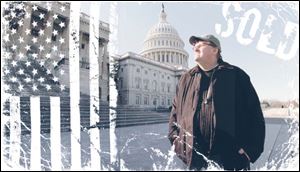
Movie review: Capitalism: A Love Story ****
10/5/2009
Michael Moore in ‘Capitalism: A Love Story.'
Michael Moore's latest, Capitalism: A Love Story, is an angry mob of a movie. The film is pitchforks and torches and violent screams to the heavens, with our economic system cast as the villain, a hulking monster rewarding the rich and subjugating the middle class to a lifetime of toil under the never-realized dream of prosperity.
Moore wants the beast, as he calls capitalism, slain.
Yet the incendiary filmmaker isn't suggesting that capitalism is purely evil - though he does include some Catholic priests who believe otherwise - or even entirely to blame for our current economic crisis.
He believes our economic system has lost its way after decades of perversion by greedy politicians in Washington and money-minded fatcats on Wall Street and in corporate America.
Capitalism, as it was in the 1950s and '60s, and even into the '70s, was a system for the people, the film says, that rewarded hard work with middle-class prosperity. While movies like last year's Revolutionary Road may challenge that notion, vilifying mid-20th-century capitalism as a harbinger of materialism, greed, and disillusionment, Moore believes the capitalism of yore struck a balance between worker effort and company reward, ensuring that employer success meant a better life for its employees.
Then corporate greed entered into the equation, tilting the balance heavily in favor of the employer.
And as the great American dream slipped further from the middle class, more consumers relied on credit cards and loans to catch it, and a system based on people buying what they need became one in which people buy what they want but often cannot afford.
It was yet another in a long line of precarious economic situations that tumbled down, like a long chain of dominoes. The predatory tactics of mortgage lenders led to massive foreclosures and a housing meltdown. Banks swayed by this colossal quake in the mortgage industry seemed poised to collapse. And as more people struggled to get by, they quit propping up our economy with
their spending power, straining businesses into layoffs. And the cycle repeated itself.
What perpetuates this, says Moore, is the dream of wealth that modern-day capitalism promises, a financial dangling carrot that most of us never reach. Perhaps the film's most powerful statement is Moore's claim that 1 percent of the richest Americans own 95 percent of our nation's wealth.
What's needed, the film suggests, is a financial revolution.
Capitalism: A Love Story contends that such a movement has already begun. Families being evicted from their homes by bank foreclosures refuse to leave, the film shows, even when law enforcement shows up. A successful workers' strike in Chicago proved that the power to overcome corporate greed and mishandling still rests with the people.
The film's populist message will resonate in today's economic climate, but Moore began work on Capitalism: A Love Story before the crisis kicked in. Was it prescience or luck? The filmmaker would claim the former.
Capitalism: A Love Story isn't Moore's best work, nor is it his most convincing. It's difficult to take on such a broad topic as capitalism as opposed to the CEO of General Motors as he did in 1989's Roger and Me.
But there's no denying the film's importance at the moment. Right, left, middle, indifferent - all political persuasions can agree that something went terribly amiss in our system (government, financial) to get us into this shape. The film isn't so much Moore piling on our battered, bruised capitalism as it is loaded commentary on what got us here. The evidence is damning, and thought-provoking to those who will give the film a chance.
It's impossible to watch this movie and not feel a sickness in the pit of your stomach about what has led us to the precipice of financial ruin, as Republicans and Democrats alike are swept up in the movie's massive political indictments. (No more calling Moore a biased liberal who ignores his party's shortcomings.)
Perhaps Capitalism: A Love Story will be the impetus we need for wholesale change. Or if change is too ambitious, given our circumstances, the film should at least spark meaningful dialogue and rigorous debate, something Moore supporters and detractors alike should welcome.
Contact Kirk Baird at:
kbaird@theblade.com
or 419-724-6734.